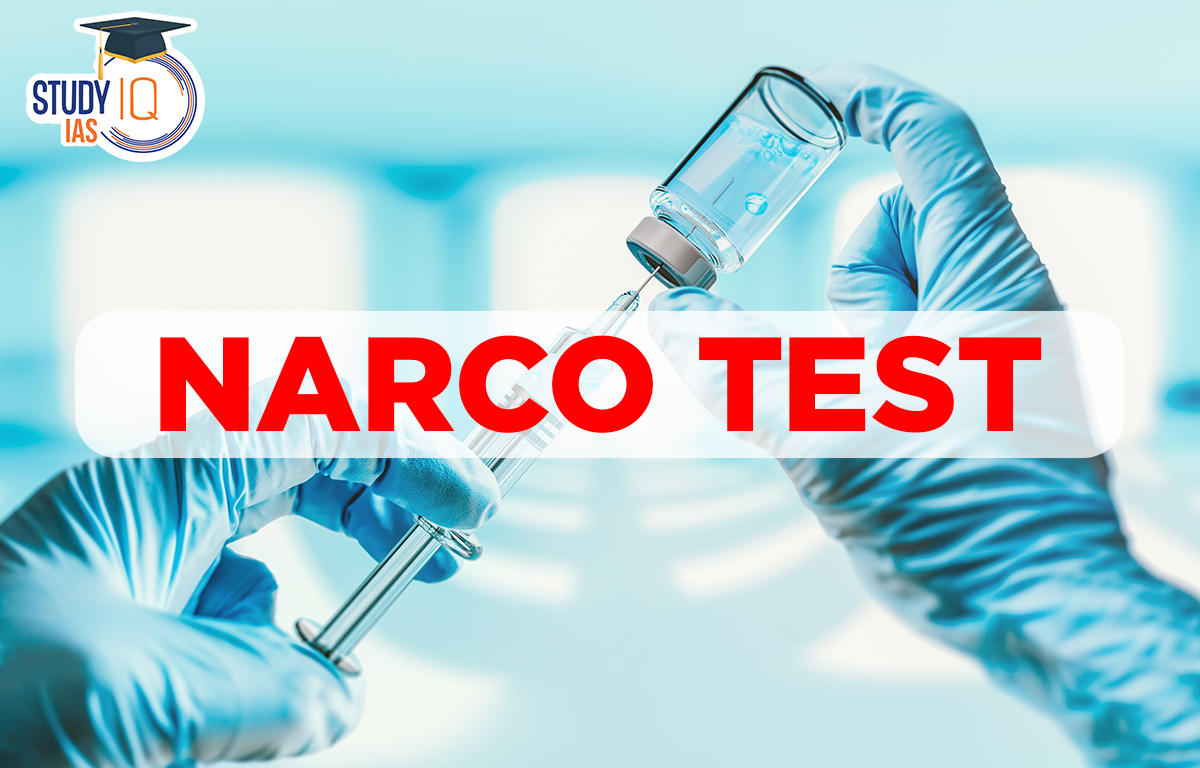Table of Contents
What is Narco Test
- Narco Test involves intravenous administration of a drug (such as sodium pentothal, scopolamine and sodium amytal) into an individual. The drug is also known as ‘truth serum’.
- Working: During the narco test, the person’s inhibitions are lowered by interfering with their nervous system at the molecular level, through usage of drugs.
- This allows them to speak without inhibition. During this stage, the person is more likely to divulge information, which would usually not be revealed in the conscious state.
- Need for Narco Test: The test is carried out after other evidences do not provide a clear picture of the case or the investigators believe that accused is hiding facts.
- Guidelines: The Narco test is carried out under the guidance and supervision of a psychologist, an investigating officer, or a forensic expert.
Narco Test Sodium Pentothal
- Sodium pentothal or sodium thiopental is a fast-acting, short duration anaesthetic.
- It is used in larger doses to sedate patients during surgery. It belongs to the barbiturate class of drugs that act on the central nervous system as depressants.
Narco Test Procedure Involved
- Before the injection of drug, the subject has to undergo a general medical examination to check their condition.
- The dosage of drug depends on the subject’s age, sex and other possible medical conditions they may have.
- Subject is nearly sedated by this drug and is allowed reach a semi-conscious state where they can answer specific questions.
- The person concerned is interrogated by the investigators in the presence of doctors. The revelations made during this stage are video recorded.
- The report provided by the expert is used in the process of collecting evidence. The procedure takes place in a government hospital, after a court order permitting the same.
- Accuracy of Narco Test:
- The accuracy of narco tests is not 100 per cent. Many subjects have made false statements in their drugged state.
- This method has been deemed as unscientific method of investigation.
Narco Test Provisions Under The Law
- In Selvi & Ors vs State of Karnataka & Anr (2010), the Supreme Court has ruled that narco analysis, brain mapping and polygraph tests cannot be conducted on any person without his or her consent.
- Those who volunteer for the procedure must have access to a lawyer, and have the physical, emotional, and legal implications of the test explained to them by police and the lawyer.
- Statements made by the subject during narco analysis test are not admissible in the court, except under certain circumstances.
- However, any information or material subsequently discovered with the help of statement made during such test can be admitted as evidence.
- Significance of narco test:
- Scientific techniques such as narco test would reduce ‘third degree’ methods currently used by investigators to obtain information from accused.
Previous Instances of Narco Test
- The Supreme Court had allowed narco test in the 2002 Godhra riots case. It was also used on Abdul Karim Telgi, in the Telgi stamp paper scam.
- The accused in the 2007 Hyderabad twin blasts case were also put under a narco test.
Similar Tests Used In Investigations
Polygraph Test:
- A polygraph test is based on the belief that physiological responses that are triggered when an individual is lying are different from what they would be otherwise.
- The process does not involve injecting drugs into the body; instead instruments like cardio-cuffs or sensitive electrodes are attached to the suspect.
- Variables such as blood pressure, respiration, pulse rate, change in sweat gland activity, blood flow, etc., are measured as questions are put to them.
- A numerical value is assigned to each response to conclude whether the person is telling the truth, is deceiving, or is uncertain.
Brain Mapping:
- Brain mapping test determines if a person is friendly with given knowledge by measuring brain activity in response to selected stimuli.
- Sensors are attached to the scalp of the accused and he/she is shown words, images or videos that stimulate brain activity.
- If the individual has knowledge about the particular information, a particular wave is generated in brain, which is captured by the sensors. This helps investigators find out if the accused is lying or not.
Read More Current Affairs :
- Read about: PESA Act
- Read about: Data Protection Bill
- Read about: Narco Test





















 WhatsApp
WhatsApp